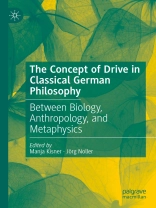This volume gathers a collection of fourteen original articles discussing the concept of drive in classical German philosophy. Its aim is to offer a comprehensive historical overview of the concept of drive at the turn of the 19th century and to discuss it both historically and systematically. From the 18th century onward, the concept of drive started to play an important role in emerging disciplines such as biology, anthropology, and psychology. In these fields, the concept of drive was used to describe the inner forces of organic nature, or, more particularly, human urges and desires. But it was in the period of classical German philosophy that this concept developed into an important philosophical concept crucial to Kant’s and post-Kantian idealistic systems. Reflecting the complexity of this concept, the volume first discusses historical sources of drive theories in Leibniz, Reimarus, and Blumenbach. Afterwards, the volume presents the philosophical accounts of drives in Kant, Fichte, Schelling, and Hegel, and also gives a systematic overview of other important drive theories that were formed around 1800 by Herder, Goethe, Jacobi, Novalis, Reinhold, Schiller, and Schopenhauer.
Mục lục
Chapter 1: Introduction.- Chapter 2: The Theory of Drive: The Dual Legacy of Leibniz’s Theory of Appetition.- Chapter 3: Between Reimarus and Kant: Blumenbach’s Concept of Trieb.- Chapter 4: Stoic dispositional innatism and Herder’s concept of force.- Chapter 5: The economy of the Bildungstrieb in Goethe’s comparative anatomy.- Chapter 6: “Wie die Triebe, so der Sinn; und wie der Sinn, so die Triebe”: Jacobi on Reason as a Form of Life.- Chapter 7: Kant on Driving Forces: Parallels and Differences in Kant’s Conceptualization of Trieb and Triebfeder.- Chapter 8: The drive to society in Kant’s Critique of the Power of Judgment.- Chapter 9: Feeling and life in Kant’s account of the beautiful and the sublime.- Chapter 10: Equine Driving: Plato, Kant and Fichte on the Teamwork of the Mind.- Chapter 11: “The drive to be an I is at the same time the drive to think and to feel.” Hardenberg/Novalis on Drives, Faculties and Powers.- Chapter 12: Drive, Will, and Reason: Reinhold and Schiller on Realizing Freedom after Kant.- Chapter 13: Drives in Schelling: Drives as cognitive faculties.- Chapter 14: The Trieb of Dialectic—Systematic and Thematic Extension of the Concept of Trieb in Hegel.- Chapter 15: Trieb and Triebe in Schopenhauer’s metaphysics of nature.
Giới thiệu về tác giả
Manja Kisner is Lecturer in Philosophy at the University of Wuppertal. She completed her Ph D and postdoc studies at the University of Munich. She has written articles and book chapters on Kant, Fichte, Schelling, and Schopenhauer. Her books include
Der Wille und das Ding an sich (2016) and
The Concept of Will in Classical German Philosophy (with J. Noller, 2020).
Jörg Noller is Lecturer in Philosophy at the University of Munich. He is the author of a number of books, editions and articles on freedom from a historical and systematic perspective, including Die Bestimmung des Willens (2016) and Kant’s Early Critics on Freedom of the Will (with J. Walsh, 2021). His research interests include metaphysics, freedom, personhood, and German Idealism.












